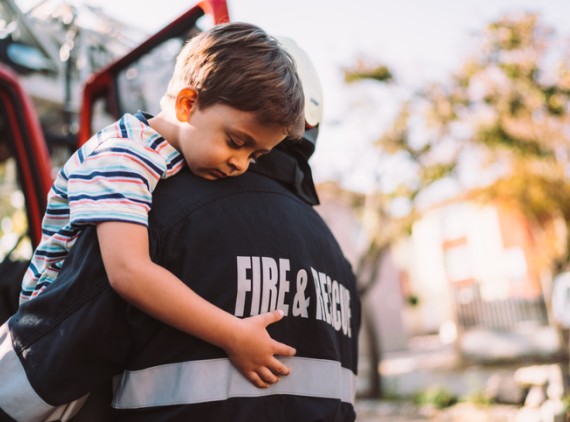Community support is critical for EMS workers’ safety and mental health
It’s National Emergency Medical Services (EMS) Week, and Phoenix Children’s would like to recognize the commitment of emergency medical technicians (EMTs), paramedics, ambulance drivers and staff, and other first responders across our state. These professionals save the lives of critically ill and injured children every day. Thank you, EMS providers!
Our community relies on our first responders to be prepared to help in any emergency, including pediatric emergencies. An emergency involving a child requires interpersonal and stress-reducing skills as well as leading-edge medical skills. That’s one reason Phoenix Children’s emergency and urgent care providers are trained and experienced in pediatric emergency care, and our emergency and urgent care facilities maintain child-friendly environments and family-centered services. We’re committed to caring for and comforting our young patients, as well as their guardians and loved ones, and ensuring that high-quality emergency care is always available for the communities we serve.
As a pediatric emergency medicine physician and the EMS medical director at Phoenix Children’s, I can personally attest to the dedication and compassion of our local EMS professionals. I’ve seen firefighters holding children’s hands, EMTs fighting for their patients’ survival and police officers comforting children in traumatic situations. I’ve seen proof of our first responders’ commitment to providing high-quality emergency care to children, and I know without a doubt that their caring makes a huge difference in the experience and outcomes of our young patients and their families.
This year marks the 47th annual EMS Week, and the theme for this year is “Rising to the Challenge.” Our nation’s first responders have certainly faced many challenges in the past year, and their courage and commitment have inspired many Americans. We tend to take for granted that when we call for help, an EMS team will respond quickly and competently. Even as a hospital provider, it’s easy to forget the hard work and hazards EMS professionals face on the job.
But then come the reminders.
In April 2022, Brendan Bessee, an Arizona emergency medical technician, was killed in a crash involving a tractor-trailer on State Route 87. According to the Arizona Department of Public Safety, the ambulance was driving with emergency lights on, while heading to a call involving a woman having complications with her pregnancy. The ambulance attempted to make a turn onto SR-87 when it was hit by the tractor-trailer.
In July 2020, Jacob “Jake” Dindinger, 20, had been working as an EMT for four months when he was shot while responding to a call in Tucson. He died less than two weeks later.
Sadly, Dindinger and Bessee are two examples of just how difficult the role of an EMS professional can be. Each year, thousands of EMS workers are injured while working, and on-the-job fatalities are not uncommon. EMS responders face many risks, including assault, hazardous environments, extreme temperatures, motor vehicle accidents, erratic work hours, and extreme physical and psychological stressors. First responders are also at an increased risk of suicide.
Make a difference
Motor vehicle accidents are a major risk for all first responders and are the main cause of on-the-job fatalities for EMTs. The hazards include crashes between vehicles and medics being swiped by passing cars on highway incidents. Each of us plays a vital role in keeping our EMS providers safe while on the road. One way we can do that is by using care and consideration whenever we see a vehicle with flashing lights or when we see first responders at work.
Our state’s “Move Over” law requires all drivers to move over one lane to create a safe margin of space when passing by any vehicle with flashing lights on the side of the road. If it’s impossible to change lanes, drivers should slow down and use extreme caution. This law went into effect in Arizona in 2005 to reduce injuries and fatalities to law enforcement officers and emergency responders.
During National EMS Week, let’s take the time to sincerely thank our first responders for their tireless commitment to our community. Let’s also rise to the challenge to help keep them safe and to ensure they have the support and resources they need. Their contribution to the medical system is vital, and their physical and mental health should be a high priority for us all.

